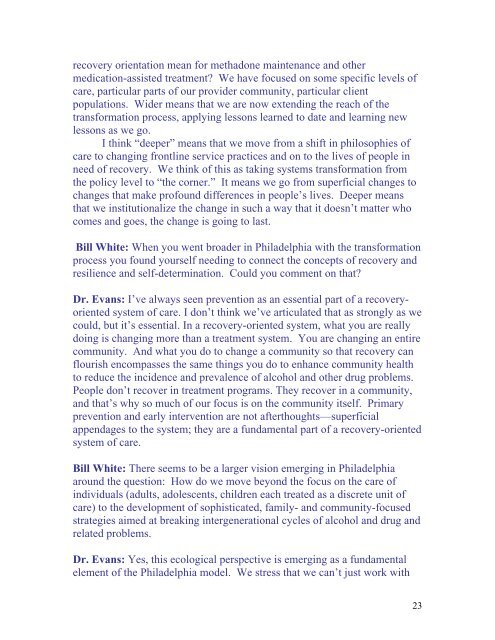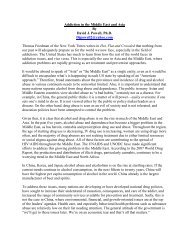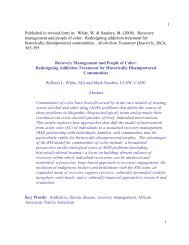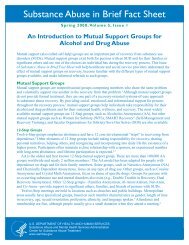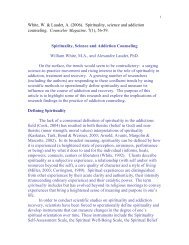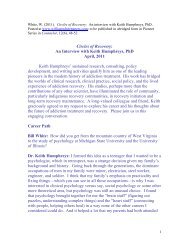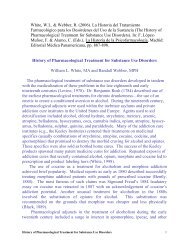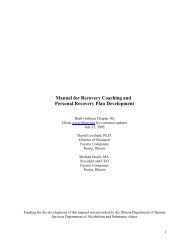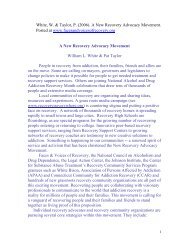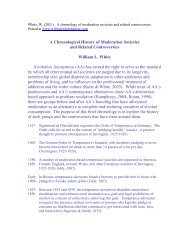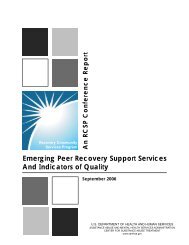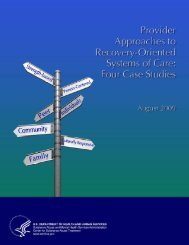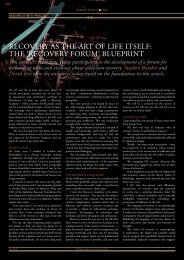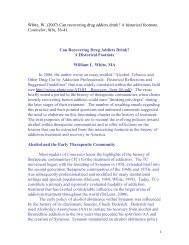An Interview with Arthur C. Evans, Jr., PhD Dr. Arthu - William L. White
An Interview with Arthur C. Evans, Jr., PhD Dr. Arthu - William L. White
An Interview with Arthur C. Evans, Jr., PhD Dr. Arthu - William L. White
- No tags were found...
Create successful ePaper yourself
Turn your PDF publications into a flip-book with our unique Google optimized e-Paper software.
ecovery orientation mean for methadone maintenance and othermedication-assisted treatment? We have focused on some specific levels ofcare, particular parts of our provider community, particular clientpopulations. Wider means that we are now extending the reach of thetransformation process, applying lessons learned to date and learning newlessons as we go.I think “deeper” means that we move from a shift in philosophies ofcare to changing frontline service practices and on to the lives of people inneed of recovery. We think of this as taking systems transformation fromthe policy level to “the corner.” It means we go from superficial changes tochanges that make profound differences in people’s lives. Deeper meansthat we institutionalize the change in such a way that it doesn’t matter whocomes and goes, the change is going to last.Bill <strong>White</strong>: When you went broader in Philadelphia <strong>with</strong> the transformationprocess you found yourself needing to connect the concepts of recovery andresilience and self-determination. Could you comment on that?<strong>Dr</strong>. <strong>Evans</strong>: I’ve always seen prevention as an essential part of a recoveryorientedsystem of care. I don’t think we’ve articulated that as strongly as wecould, but it’s essential. In a recovery-oriented system, what you are reallydoing is changing more than a treatment system. You are changing an entirecommunity. <strong>An</strong>d what you do to change a community so that recovery canflourish encompasses the same things you do to enhance community healthto reduce the incidence and prevalence of alcohol and other drug problems.People don’t recover in treatment programs. They recover in a community,and that’s why so much of our focus is on the community itself. Primaryprevention and early intervention are not afterthoughts—superficialappendages to the system; they are a fundamental part of a recovery-orientedsystem of care.Bill <strong>White</strong>: There seems to be a larger vision emerging in Philadelphiaaround the question: How do we move beyond the focus on the care ofindividuals (adults, adolescents, children each treated as a discrete unit ofcare) to the development of sophisticated, family- and community-focusedstrategies aimed at breaking intergenerational cycles of alcohol and drug andrelated problems.<strong>Dr</strong>. <strong>Evans</strong>: Yes, this ecological perspective is emerging as a fundamentalelement of the Philadelphia model. We stress that we can’t just work <strong>with</strong>23


